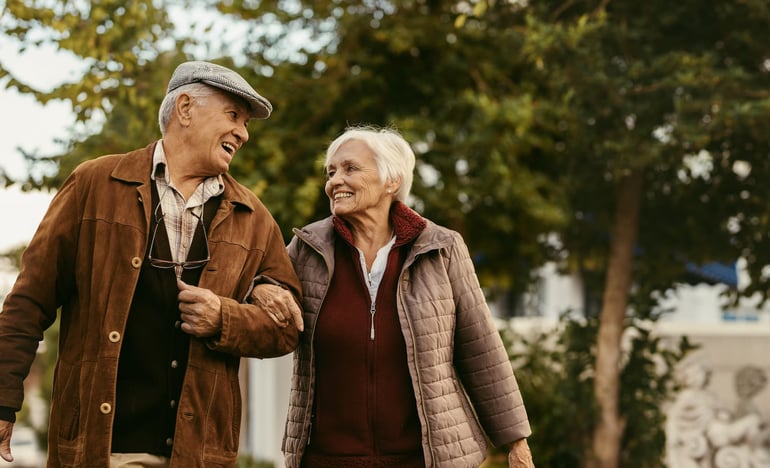 The last thing many seniors want to do during the blustery, snowy winter months makes decisions about moving from their current homes to a retirement community — not to mention loading up a moving truck. Yet, there are many advantages to making these life changes in time to avoid at least some of the winter season.
The last thing many seniors want to do during the blustery, snowy winter months makes decisions about moving from their current homes to a retirement community — not to mention loading up a moving truck. Yet, there are many advantages to making these life changes in time to avoid at least some of the winter season.
Between the health advantages, saying goodbye forever to outdoor chores, and better home-sale prospects, now is the time to look into senior housing.
Escaping the Hazards of Winter
After a lifetime of dealing with the colder months, you’re already familiar with the season’s snowed-in driveways, slippery sidewalks, and slushy parking lots.
And seniors know better than anyone that these things aren’t just uncomfortable. They also present a serious falling risk. In addition, shoveling those walkways and driveways is a recipe for a slip and fall or back sprain.
Often, older people face the dilemma of either braving the outdoors to clear snow or paying for expensive snow-removal services. There’s an additional risk when it comes to driving on winter roads in order to get groceries to restock their shelves.
Yet, in a retirement community, these worries vanish. Sidewalks, parking lots, and other outdoor areas are kept shoveled and sanded. The included services also eliminate or reduce the need for shopping or for braving the elements just to put out the garbage or fetch the mail.
All of these factors add up to a markedly decreased risk of falling or getting sick. Seniors still have their independence — but they also have support staff to make winter life much more comfortable.
Selling in a “Hot” Market
Giving up the family home is an emotional time. But it can help to know when the best time to put that “for sale” sign out is. Surprisingly, winter home sales are often higher than any other season.
Since many older people are more apt to find the wintertime the hardest time to be a homeowner, it’s a happy coincidence that it’s also the best time to sell faster and at a better price.
Beating the Winter Blues
Winter is often the loneliest time for seniors. The lack of sunlight tends to affect older people more than younger adults, which can lead to depression and other health risks. Getting around is also much more challenging in the cold, messy months. Even those who live in the same general area as their family members still have empty days or weeks between visits, leaving them without those vital daily interactions with other people.
Loneliness can cause more than the blues. It can also lead to a feeling of pessimism. That level of discouragement makes small challenges feel much more overwhelming, and the things that a person typically looks forward to are less appealing.
In turn, seniors may feel less inclined to keep up healthy daily routines like taking their medication, getting enough to eat, or taking a walk on pleasant days.
In an independent living neighborhood, on the other hand, socializing is “baked in” to the daily experience. People who are naturally extroverted immediately thrive in an atmosphere in which painting classes, yoga sessions, and interesting lectures are all within a short indoor walk from their front door.
And even those who have never been social butterflies will still benefit from greeting neighbors while dining, going to chapel, visiting the internet cafe, or chatting with others on their way to check out a book or retrieve their mail. To go from weeks of seeing virtually no one to counting on being able to exchange smiles and pleasantries every day makes an enormous difference for a senior’s mental and physical health.
Increasing Your Access to Healthcare
Winter, notoriously, is the cold and flu season. For seniors, those previously “nuisance” illnesses can become much more severe. That’s why moving to a retirement community can significantly boost health and wellness during these months, both in terms of prevention and treatment.
With more services and goods available within the retirement community itself, residents are less likely to need to brave the elements during times of snow, frigid winds, or sleet.
In addition, the healthy meals provided in an independent living community are created with boosting the immune system in mind. Wellness opportunities like water exercise and other workout classes, along with exercise equipment, also help fight off illness.
But because people can still get sick despite preventative measures, it’s equally important that they have reliable access to medical monitoring and treatment. Many independent living communities, including Deupree House, have a nurse on-site, as well as 24-hour emergency response systems, rehabilitative therapy, and other medical care options.
Not sure how soon you can make a winter move happen? One of our team members can get back to you if you request more information. We’ll let you know what options are available at Deupree House when it comes to residential situations. We can also tell you more about the services and amenities that help seniors have a safer, healthier winter season.












